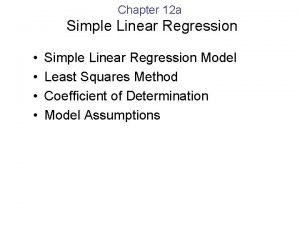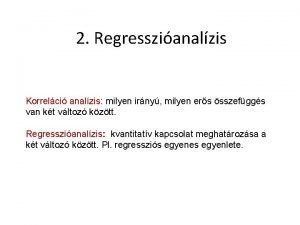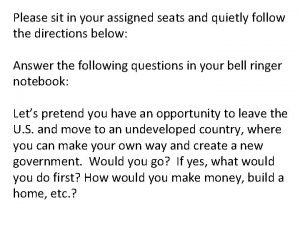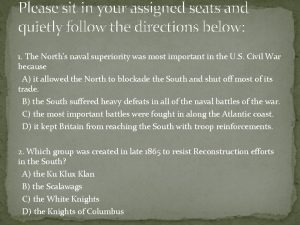SSR Log Tuesday 408 Please sit quietly with












































- Slides: 44

SSR + Log Tuesday 4/08 Please sit quietly with your desks cleared and have your pencil/pen ready for SSR

SSR + Log Tuesday 4/08 Please take two minutes to discuss our SSR article with your table mates. When you receive your SSR Meta-cognitive log please read the directions and select and circle five sentence stems to help complete the activity

Bell Work Wednesday 4/09 Look in your book beginning on page 717 and begin reading to find the answers • 1. What were the four factors that contributed to Britain’s Industrialization? • 2. How did the rising population benefit the Industrial Revolution? • 3. What American invention aided in the textile industry?

The Industrial Revolution Chapter 25

Section 1 -The Beginnings of Industrialization

Industrial Revolution Begins in Britain • The Industrial Revolution– The increased output of machine-made goods beginning in England in the mid 1700’s • Enclosures– Large fenced in fields in which landowners experimented with productive seeding and harvesting methods to boost crop harvests

Industrial Revolution Begins in Britain • Seed Drill– Invented by Jethro Tull in 1701 that allowed farmers to plant seeds in wellspaced rows at specific depths. • Crop Rotation– Designed to rotate crops that drained nutrients from the soil (ex. Wheat) with crops that replenish them (ex. Turnips)

Industrial Revolution Begins in Britain • Industrialization- The process of developing the machine production of goods through the use of natural resources. – Natural Resources used for Industrialization • Water and coal power • Iron Ore to construct tools, machines and buildings • Rivers for inland transportation • Harbors for the ships to set sail

Industrial Revolution Begins in Britain • Factors of Production. The resources needed to produce goods and services that the Industrial Revolution required. – Ex. Land, labor and capital (a. k. a wealth)

Improvements in Transportation • Entrepreneur-Someone who organizes, manages, and takes on the risks of a business. • The steam engine was modified by James Watt for increased efficiency. – Ex. Robert Fulton's Clermont was a steam ship that ferried passengers up and down the Hudson River

The Railway Age Begins • The steam powered railroad locomotive was the driving force behind English industry after 1820 • Steam-Driven Locomotives– 1804 Richard Trevithick won several thousand dollars on a bet that he could haul 10 tons of iron ore nearly 10 miles with a steam engine

The Railway Age Begins • The Liverpool-Manchester Railroad– English entrepreneurs wanted a rail line to connect the cities of Liverpool and Manchester. – A contest was held to see which train would run on the line • George Stephenson’s Rocket won by hauling 13 tons at nearly 24 miles per hour

The Railway Age Begins • Railroads Revolutionize Life in Britain– The Four Major Effects of the Locomotive • Materials and finished products were cheap to transport • The new rail lines created thousands of new jobs • Agricultural and fishing industries saw a boost b/c of new transportation opportunities • Travel became easier and people could now live farther from their jobs

Bell Work Thursday 4/10 Look in your book beginning on page 723 and begin reading to find the answers • 1. Why did people flock to cities and towns during the Industrial Revolution? • 2. What social class expanded as a result of industrialization? • 3. What were some of the negative effects of the rapid growth of Manchester?

Bell Work Thursday 4/30 Please answer the following prompt in a complete paragraph: In order to provide for a family often parents/guardians work long hours or sacrifice their personal desires for the good of those they love. Tell me about someone you know/look up to and describe what they do to care for your family. (Make sure to give quality examples) Sentence Stem Ex: I really look up to my ____ because…….

Section 2 -Industrialization

Industrialization Changes Life • Industrialization had positive and negative effects on the lives of Britain’s citizens – Positive Effects • Most peoples quality of life improved • There was a plentiful supply of jobs – Negative Effects • Change to machine production initially caused human suffering • Working conditions were often unhealthy • Rising class tensions

Industrialization Changes Life • Urbanization- The building of new cities and the movement of people to these cities – Between 1800 and 1850 the number of cities with more than 100, 000 inhabitants grew from 22 to 47

Industrialization Changes Life • Living Conditions– Due to the rapid growth of English cities they had several problems • No development plan • No sanitary codes • No building codes – They also lacked adequate • Education • Housing • Police Protection

Industrialization Changes Life • Typical living conditions– People lived in dark, dirty houses, with one family in a room – Diseases like cholera was common due to poor removal of excrement – A British study estimated a life span of factory workers to be 17 years compared to 38 years for those living in rural areas

Industrialization Changes Life • Working Conditions– In order to be a productive as possible companies often had their employees work 14 hour shifts, 6 days a week – Other Issues • Dark and dirty factories • Boilers might explode or limbs could get caught in machines – No workman’s comp if you were injured on the job • Mines were the most dangerous – Miners lived 10 years less than anyone else

Class Tensions Grow • Middle Class-A social class made up of skilled workers, professionals, business people and wealthy farmers – Middle Class was neither rich nor poor – Upper middle class was made up of: • Gov. employees, doctors, lawyers, and those who managed mines, and shops – Lower middle class was made up of: • Tool makers, mechanical drafters, and printers

Class Tensions Grow • Working Class– Between 1800 and 1850 workers saw little improvement in living and working conditions • Angry that their livelihoods were disappearing due to labor saving machines they began to destroy them out of anger

Positive Effects of the Industrial Revolution • Positive Effects of the Revolution– Created new jobs – Contributed to the wealth of the nation – Technological progress was made through new inventions – Production of consumer goods increased – Standard of living was raised

Positive Effects of the Industrial Revolution • Long Term Effects– Consumer goods considered luxuries 50 -60 years ago are now affordable for everyone – Profits from industrialization creates tax revenue • These funds allow government to raise the standard of living for city dwellers

Bell Work Monday 5/04 Look in your book beginning on page 729 and begin reading to find the answers • 1. What early industries mechanized in the United States? • 2. Why did Belgium lead Europe in Industrializing? • 3. How did the Industrial Revolution shift the balance of power in the world?

Section 3 -Industrialization Spreads

Industrial Development in the United States • During the War of 1812 the British blockade forced the U. S. to develop their own industry • Luckily the U. S. had the same resources that allowed Britain to industrialize – Fast flowing rivers – Deposits of coal and iron ore – Supply of laborers

Industrial Development in the United States • U. S. industrialization began in the textile industry – Britain wouldn’t let mechanics, tool makers, or engineers leave the country • 1813 -Francis Cabot Lowell and four other investors opened up a factory that mechanized every stage of cloth manufacturing – Young women began to work in these factories earning more money and finding independence

Industrial Development in the United States • Later Industrial Expansion– The U. S. largely agricultural until after the Civil War ended in 1865 • Technological Boom– Light bulb and the telephone met the demands of a booming population

Industrial Development in the United States The Rise of Corporations • Stock- Certain rights of ownership sold to help entrepreneurs open or expands their business • Corporation-A business owned by stock holders who share in it’s profits but are not personally responsible for it’s debts

Continental Europe Industrializes • European businessmen yearned to replicate the “British miracle” of rapidly manufacturing goods • The Napoleonic Wars had halted trade, interrupted communication and caused inflation in Europe • Continental Europe’s industrialization began in Belgium

Continental Europe Industrializes • Germany Industrializes– Germany was politically divided – Economic isolation and scattered resources hampered industrialization – Around 1835 Germany began to copy the Britain by importing British equipment and engineers • They also sent their kids to England to learn industrial management

Impact of Industrialization • The Rise of Global Inequality – Global trade was strengthened but the gap between the industrialized and unindustrialized widened • This led to the increased colonization of smaller countries for natural resources – Due to imperialism European economies were based on industry while Asian and African economies were still based on agriculture

Bell Work Tuesday 4/15 Look in your book beginning on page 734 and begin reading to find the answers • 1. What were Adam Smith’s three natural laws of economics? • 2. What kind of society did early socialists want? • 3. Why did workers join together to form unions?

Section 4 -Reforming the Industrial World

The Philosophies of Industrialization • Laissez-faire-An economic policy of letting owners of industry and business set working conditions with out (gov. ) interference – French for “let people do as they please” • Capitalism-An economic system where the factors of production are privately owned and money is invested to make a personal profit

The Philosophies of Industrialization • Adam Smith-Professor at the University of Glasgow (Scotland) wrote the Wealth of Nations in 1776 – His book defended the idea of a free economy, saying “economic liberty guaranteed economic progress”

The Philosophies of Industrialization • Adam Smith’s Three Natural Laws of Economics – The Law of Self-Interest • People work for their own good – The Law of Competition • Competition forces people to make a better product – The Law of Supply and Demand • Maximum amount of goods will be produced at the lowest possible price to meet the needs of the people

The Rise of Socialism • Utilitarianism-The theory that people should judge ideas, institutions, and actions on the basis of their utility and usefulness • Socialism- An economic system where the factors of production are owned by the public and operate for the welfare of all

Marxism: Radical Socialism • Marxism-Radical form of socialism introduced by Karl Marx in a 23 page packet called “The Communist Manifesto” – Felt the Industrial Revolution enriched the wealthy and improvised the poor. • He felt the workers would overthrow the owners • Marx felt communism was the “complete form of socialism”

Labor Unions and Reform Law • Unions- Voluntary labor associations in which workers joined together to press for reforms • Strikes- A collective refusal to work – Workers will usually strike until their demands for the improvement of working conditions or higher wages is met

Labor Unions and Reform Law • Laws that Reformed Working Conditions in England – Factory Act of 1833 • Made it illegal to hire kids under 9 to work in the factory – Kids 9 -12 couldn’t work more than 8 hours a day – Kids 13 -17 couldn’t work more than 12 hours a day – Mines Act 1842 • Women and children could no longer work underground in the mines – Ten Hours Act of 1847 • Limited the work day of women and children in factories to 10 hours

The Reform Movement Spreads • The Abolition of Slavery– The British abolished slavery in 1833 – The American’s abolished slavery 1865 – Puerto Rico abolished slavery 1873 – Brazil abolished slavery 1888
 When others wear uniform, the rebel
When others wear uniform, the rebel Sit down quietly
Sit down quietly Sit down quietly
Sit down quietly Penyelesaian pertidaksamaan log(x-4)+log(x+8) log(2x+16)
Penyelesaian pertidaksamaan log(x-4)+log(x+8) log(2x+16) Plogs meaning
Plogs meaning Diketahui log 2 = 0 301 dan log 5 = 0 699
Diketahui log 2 = 0 301 dan log 5 = 0 699 699 artinya
699 artinya ³log27=
³log27= Jika nilai log 2 = a maka nilai log 80 adalah
Jika nilai log 2 = a maka nilai log 80 adalah Jika log 3=0 477 dan log 5=0 699 maka log 45 adalah
Jika log 3=0 477 dan log 5=0 699 maka log 45 adalah Jika log 2=0 301
Jika log 2=0 301 Sncc sit ins
Sncc sit ins Saturated and unsaturated solutions worksheet
Saturated and unsaturated solutions worksheet Paint must never hope to reproduce the faint
Paint must never hope to reproduce the faint Come in and ....................... a seat!
Come in and ....................... a seat! Please sit back and relax
Please sit back and relax Please sit down and your seat belts
Please sit down and your seat belts Please sit down
Please sit down Please sit at the table
Please sit at the table Sit in your seat
Sit in your seat Will you please sit at the table
Will you please sit at the table Will you please be quiet please raymond carver
Will you please be quiet please raymond carver Cs 408 sabancı
Cs 408 sabancı Uiuc cs 483
Uiuc cs 483 Ece 408
Ece 408 Usace section 408
Usace section 408 Ece 408
Ece 408 Amministratore di sostegno lite tra fratelli
Amministratore di sostegno lite tra fratelli Chapter 408 nyc doe
Chapter 408 nyc doe Pub 408
Pub 408 Cse408
Cse408 Map study in highway engineering
Map study in highway engineering Ece 408
Ece 408 Ece 408
Ece 408 Form 408b2
Form 408b2 Ssr reunion
Ssr reunion Least square method
Least square method Ssr 13
Ssr 13 Iaea ssr-5
Iaea ssr-5 Ssr licancheu
Ssr licancheu Determinációs együttható
Determinációs együttható Pmsi
Pmsi Ssr-5
Ssr-5 Ssr mode s
Ssr mode s Plactidil
Plactidil




































































